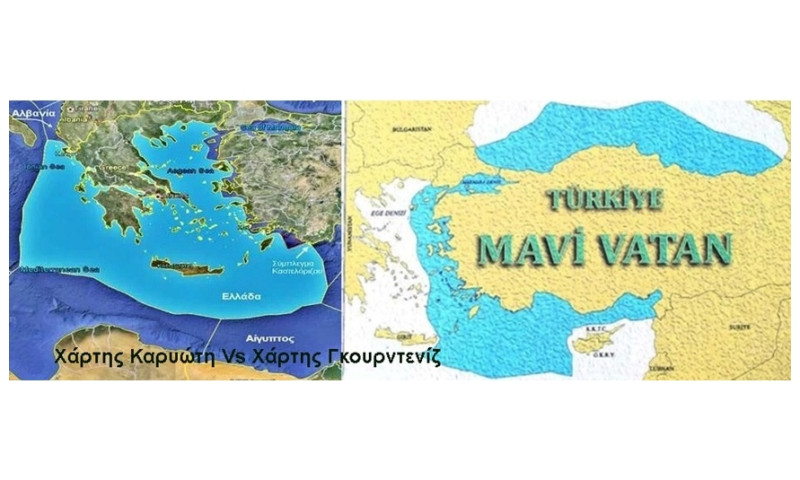The Friends of War To Be Re-examined

Costas Vergos
10 Mar 2021
/ 16:03
Article by Costas Vergos.
Greek-Turkish talks do not invalidate Turkey's onerous casus belli. They do not even undo the graying of 150 Greek islands and islets. Nor do they disprove the occasionally rude statements of the neighbor's leadership. But until we sink Cesme or Oruc Reis (and the then incubent Hague not justifying us because we will have sunk foreign vessels in international waters), we must talk - "exploratorily".
Given those, let us examine the peculiar alliance (in favor of the arms industry) of the friends of war on both sides of the Aegean. Recently, pro-war television and internet panels have risen sharply in both countries. Military and geopolitical analysts are (mis)informing people and systematically (and sometimes extortionately) proposing to their respective leaderships, firstly, branded weapon products (proposing as who?), secondly, far-reaching alliances (stretching up to the Far East!), thirdly, the "first military blow" (where exactly?).
In a crowded Turkish television panel, it was agreed, the other day, to occupy the Greek islands "overnight". A similar Greek panel immediately returned fire, sinking boats and confining the invaders in concentration camps. (I am afraid that all of them will send their children abroad at the critical moment, as they used to.)
- But let's see what is currently being heard by the Greek haranguing side:
1) The international law of the sea with its 320 articles (Montego Bay, 1982) prioritizes the territorial waters and EEZ of each country. Inaccurate. The international law of the sea prioritizes the territorial waters of each country, free navigation and free scientific research.
2) The international law of the sea considers territorial waters and the EEZ a unilateral right. Inaccurate. The international law of the sea considers the former to be a unilateral right and provides for bilateral (or even multilateral) agreements for the latter if the distance between the opposed coastal countries is less than 400 miles. Until these agreements are reached, there are no EEZs.
3) The international law of the sea precisely defines the method of delimitation of EEZs. Inaccurate. The international law of the sea does not specify how to delimit the EEZ in the case of opposing coastal countries with a distance of less than 400 miles. Common understanding, power projection or the international courts have the first say here. [International case law varies from 'for us' (eg French little islands off the coast of Canada) to 'against us' (eg Bahrain little islands off the coast of Qatar).]
4) The international law of the sea defines territorial waters at 12 miles from the coast. Inaccurate. The international law of the sea stipulates that territorial waters are "up to a limit not exceeding 12 nautical miles". (By this I do not suggest to stay at 6. I suggest we tell the truth.) (The contiguous zone of the extra 12 miles is only for the prosecution of crime.)
5a) The international law of the sea stipulates that the surface of the EEZ belongs to the country. Inaccurate. The international law of the sea stipulates that the surface of the EEZ belongs to free navigation and scientific research. A boat from country X can sail and conduct research on the surface of the EEZ of country Z. (If the country Z sinks it, it is in the wrong.)
5b) The international law of the sea defines "blue homelands". Inaccurate. The international law of the sea does not define "blue homelands" but coastal zones. Thus, the (overlapping) so-called "blue homelands" of Turkey and Greece (450,000 sq km each) are not exactly homelands, but (beyond the 6 or 12 miles) economic rights subject to the condition and agreement of the opposing coastal country.
6) All countries except Turkey have signed the international law of the sea. Inaccurate. 16 countries (USA, Israel, Turkey etc) did not sign it. (Palestine signed, who dares not fish!)
PS.1. Taken together, the EEZs of all the coastal countries of the world constitute 38% of the sea surface of the earth. Nobody wants this huge area to belong to the jurisdiction of the countries. Greek merchant shipping does not want it, all the more more.
PS.2. The most complex issue of the over-ten-year processing of the current law of the sea has proved to be the issue of the distinction between scientific research, which is free, and the exploration, which belongs to the holder of the EEZ.
PS.3. A bilateral agreement between Greece and Cyprus on the mutual drawing up of EEZ could be interfered by a corresponding Turkey-Egypt agreement. Geography and international case law have the first word here. The agreement east of the 28th will be quadripartite, if there is ever an agreement.
PS.4. You, to be re-examined on Thucydides, αίσχιον έχοντας αφαιρεθήναι ή κτωμένους ατυχήσαι, [more shame to let them take away what you have than to fail to get something. (2.62.4).] So we, who out of memoranda and mortgages lost almost the entire land and sea homeland we had, must be very ashamed. And if, as you say, there are so many hundreds of billions of euros from the submarine wealth, well, let's take half of them (ie eight times more, per capita!) to pay off the oppressive creditors and get our financial freedom for the first time in 200 years. (One way or another, we're heading towards the elimination of conventional energy sources, and you intend to fight with each other over the Belharra and Rafale, long after the abolition.)
Given those, let us examine the peculiar alliance (in favor of the arms industry) of the friends of war on both sides of the Aegean. Recently, pro-war television and internet panels have risen sharply in both countries. Military and geopolitical analysts are (mis)informing people and systematically (and sometimes extortionately) proposing to their respective leaderships, firstly, branded weapon products (proposing as who?), secondly, far-reaching alliances (stretching up to the Far East!), thirdly, the "first military blow" (where exactly?).
In a crowded Turkish television panel, it was agreed, the other day, to occupy the Greek islands "overnight". A similar Greek panel immediately returned fire, sinking boats and confining the invaders in concentration camps. (I am afraid that all of them will send their children abroad at the critical moment, as they used to.)
- But let's see what is currently being heard by the Greek haranguing side:
1) The international law of the sea with its 320 articles (Montego Bay, 1982) prioritizes the territorial waters and EEZ of each country. Inaccurate. The international law of the sea prioritizes the territorial waters of each country, free navigation and free scientific research.
2) The international law of the sea considers territorial waters and the EEZ a unilateral right. Inaccurate. The international law of the sea considers the former to be a unilateral right and provides for bilateral (or even multilateral) agreements for the latter if the distance between the opposed coastal countries is less than 400 miles. Until these agreements are reached, there are no EEZs.
3) The international law of the sea precisely defines the method of delimitation of EEZs. Inaccurate. The international law of the sea does not specify how to delimit the EEZ in the case of opposing coastal countries with a distance of less than 400 miles. Common understanding, power projection or the international courts have the first say here. [International case law varies from 'for us' (eg French little islands off the coast of Canada) to 'against us' (eg Bahrain little islands off the coast of Qatar).]
4) The international law of the sea defines territorial waters at 12 miles from the coast. Inaccurate. The international law of the sea stipulates that territorial waters are "up to a limit not exceeding 12 nautical miles". (By this I do not suggest to stay at 6. I suggest we tell the truth.) (The contiguous zone of the extra 12 miles is only for the prosecution of crime.)
5a) The international law of the sea stipulates that the surface of the EEZ belongs to the country. Inaccurate. The international law of the sea stipulates that the surface of the EEZ belongs to free navigation and scientific research. A boat from country X can sail and conduct research on the surface of the EEZ of country Z. (If the country Z sinks it, it is in the wrong.)
5b) The international law of the sea defines "blue homelands". Inaccurate. The international law of the sea does not define "blue homelands" but coastal zones. Thus, the (overlapping) so-called "blue homelands" of Turkey and Greece (450,000 sq km each) are not exactly homelands, but (beyond the 6 or 12 miles) economic rights subject to the condition and agreement of the opposing coastal country.
6) All countries except Turkey have signed the international law of the sea. Inaccurate. 16 countries (USA, Israel, Turkey etc) did not sign it. (Palestine signed, who dares not fish!)
PS.1. Taken together, the EEZs of all the coastal countries of the world constitute 38% of the sea surface of the earth. Nobody wants this huge area to belong to the jurisdiction of the countries. Greek merchant shipping does not want it, all the more more.
PS.2. The most complex issue of the over-ten-year processing of the current law of the sea has proved to be the issue of the distinction between scientific research, which is free, and the exploration, which belongs to the holder of the EEZ.
PS.3. A bilateral agreement between Greece and Cyprus on the mutual drawing up of EEZ could be interfered by a corresponding Turkey-Egypt agreement. Geography and international case law have the first word here. The agreement east of the 28th will be quadripartite, if there is ever an agreement.
PS.4. You, to be re-examined on Thucydides, αίσχιον έχοντας αφαιρεθήναι ή κτωμένους ατυχήσαι, [more shame to let them take away what you have than to fail to get something. (2.62.4).] So we, who out of memoranda and mortgages lost almost the entire land and sea homeland we had, must be very ashamed. And if, as you say, there are so many hundreds of billions of euros from the submarine wealth, well, let's take half of them (ie eight times more, per capita!) to pay off the oppressive creditors and get our financial freedom for the first time in 200 years. (One way or another, we're heading towards the elimination of conventional energy sources, and you intend to fight with each other over the Belharra and Rafale, long after the abolition.)








